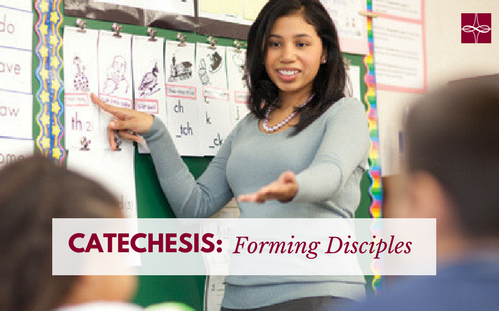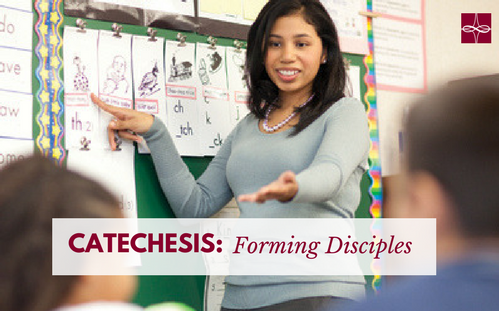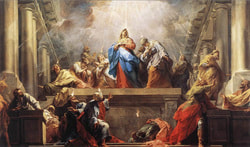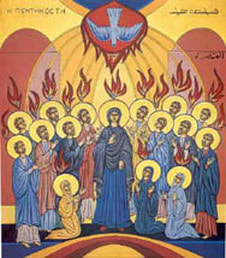|
When I was in 8th grade, I helped teach for my parish’s religious education program and counted the hours toward my required community service time before receiving the Sacrament of Confirmation. I was an assistant for the 5th grade, and I thought it was the coolest thing. I could share with the class what I knew about the Church, even teaching them at one point how to pray the Rosary. Looking back, it seems like I was destined to teach in a Catholic school! After college, I began working at my current school in the Archdiocese of Washington (ADW), where I continue to teach and share my faith with the students. To this day, I continue to teach religion. I strive to form my students as disciples according to six elements of Catholic life: Knowledge of the Faith, Liturgy and Sacraments, Morality, Prayer, Education for Living in Christian Community, and Evangelization and Apostolic Life.
For catechists who actively pass on the Word of God to others, teaching the faith can become almost second nature. For instance, at my school, we incorporate core Jesuit principles into the curriculum each day and reflect on our own actions through prayer. In my pre-K classroom, we use these principles to talk about kindness and loving others as St. Ignatius taught. In a special way, my students are learning how to be good friends and love others the way Jesus did. In the Archdiocese of Washington (ADW), the religious curriculum has standards by which its content is measured and assessed—like any other subject area in school. In fact, ADW is trying to support catechists to do more to collaborate and keep kids engaged and excited about learning their faith. Professional development of catechists is crucial to a school, parish, or community. Learning how to be better witnesses of the faith ensures that our children are receiving the best formation of conscience they can get. Although there are people certified and educated to teach as catechists, most of us are already fulfilling that duty as faith-filled adults in the Church who witness to and spread the Gospel. Below is a list I have compiled of a description of a catechist. After reading it, do you feel called to become one?
For more information, we invite you to view the following webinar at the bottom of the page:
Question for Reflection: How can you teach the faith to others in your everyday life?
0 Comments
When I was in 8th grade, I helped teach for my parish’s religious education program and counted the hours toward my required community service time before receiving the Sacrament of Confirmation. I was an assistant for the 5th grade, and I thought it was the coolest thing. I could share with the class what I knew about the Church, even teaching them at one point how to pray the Rosary. Looking back, it seems like I was destined to teach in a Catholic school! After college, I began working at my current school in the Archdiocese of Washington (ADW), where I continue to teach and share my faith with the students. To this day, I continue to teach religion. I strive to form my students as disciples according to six elements of Catholic life: Knowledge of the Faith, Liturgy and Sacraments, Morality, Prayer, Education for Living in Christian Community, and Evangelization and Apostolic Life.
For catechists who actively pass on the Word of God to others, teaching the faith can become almost second nature. For instance, at my school, we incorporate core Jesuit principles into the curriculum each day and reflect on our own actions through prayer. In my pre-K classroom, we use these principles to talk about kindness and loving others as St. Ignatius taught. In a special way, my students are learning how to be good friends and love others the way Jesus did. In the Archdiocese of Washington (ADW), the religious curriculum has standards by which its content is measured and assessed—like any other subject area in school. In fact, ADW is trying to support catechists to do more to collaborate and keep kids engaged and excited about learning their faith. Professional development of catechists is crucial to a school, parish, or community. Learning how to be better witnesses of the faith ensures that our children are receiving the best formation of conscience they can get. Although there are people certified and educated to teach as catechists, most of us are already fulfilling that duty as faith-filled adults in the Church who witness to and spread the Gospel. Below is a list I have compiled of a description of a catechist. After reading it, do you feel called to become one?
For more information, we invite you to view the following webinar at the bottom of the page:
Question for Reflection: How can you teach the faith to others in your everyday life? Sometimes it’s easy to feel a little bit lost in Ordinary Time. We know that during Advent we are preparing our hearts and homes to celebrate the joys of Christmas. We light the candles of the Advent wreath, we sing Advent hymns, send Christmas cards, and prepare our Christmas gifts. During Lent, we fast, pray, and focus on giving what we have whether that be time, talent, or alms. We usually know that it is a time to repent and focus on daily mortifications that will draw us into a closer relationship with our Triune God and lead us to a beautiful celebration of the mysteries of our faith. So, what happens in the quiet stillness of Ordinary Time? I have recently come to be both terrified and in awe of this passage of time. Reflecting on the purpose and importance of this liturgical period, I am reminded of the story of Simon, James, and John in Luke 5: 1 - 11. The skill and trade of fishing is a perfect analogy for us. Fishing requires knowledge, skill, practice, patience, and, possibly above all, trusted intuition. Let us imagine this scenario as it unfolds. Simon, James, and John have been working throughout the night. They are no doubt exhausted and deflated when Jesus asks them to go out yet again. How often do we feel like this? How often do we feel God nudging us to try one more time, to keep going, to persevere? How do we respond to that? Do we quietly take our boat back out onto the water? Or do we rail against his request? In Luke 5: 4, Jesus does not simply ask that the boats be taken back out. He specifically asks Simon to “put out into deep water…” Where are the deep waters in our life? Where are the areas that Jesus is calling us that we cannot touch or perhaps not even see the bottom? The interchange that follows is striking. After Jesus asks Simon to lower his net, Simon replies that they have worked throughout the night and have caught nothing, “but at your command I will lower the nets.” Are we trusting Jesus enough in our lives to lower our nets of prayer, spiritual, or physical action when we have been toiling and have failed to see the fruits of our labor? After the resurrection, Jesus again meets His disciples in this way in John 21. After an uneventful day of fishing in the sea of Tiberias, Jesus instructs the disciples to cast their nets back into the water. They did not even recognize him at first but did as He instructed. The catch was so full that they struggled to pull it in. In both instances, Jesus requests His disciples to take action just one more time before giving up. Ordinary Time is our time of action and risk taking. This is our chance to act on our belief in God, the belief that we profess and strive to deepen during Advent and Lent. Are we praying and living as if we truly believe that the Triune God is all powerful and miraculous? Are we using the term, “Thy will be done” as a contrite spiritual, physical, mental, and emotional submission to His divine will and purpose or are we praying those words in the hopes that He will take action so that we can remain in our comfort zone? What open sea do we need to cast our net into? What prayer have we given up on because we’ve forgotten that God exists outside of time? This is when we put into action all that we’ve seen and heard. He is speaking our name, inviting us to trust Him, to “put out into deep water” and cast our net. We celebrate Pentecost on June 8th, 50 days after Easter, to commemorate the Holy Spirit’s descent on Christ’s disciples after His Ascension. We are, in many ways, celebrating the birthday [E1] of the Church and our individual commitments to God.
The Holy Spirit empowers us to share our faith, to have the ability to open our hearts in understanding one another and God’s message. Through the gifts of the Holy Spirit (wisdom, understanding, counsel, knowledge, fortitude, piety and fear of the Lord), we become fully alive in our personal relationship with God so we can give better witness to His message. The Catechism of the Catholic Church says, “…the Church is sent to announce, bear witness, make present, and spread the mystery of the communion of the Holy Trinity” (CCC 738). We can use Pentecost as an opportunity to make our faith our own while sharing God’s word. By utilizing our individual talents and volunteering in some aspect of our church, we strengthen our faith and build community. I remember wanting to be an altar server after receiving my first Holy Communion in second grade. I began altar serving and continued to do so until I received Confirmation. Serving during the Mass allowed me, as a young girl, to better understand my Catholic faith. My parents remember me saying how I enjoyed altar serving because I had to pay attention (and stay awake) during 8 a.m. Sunday Mass. Assisting the priest on the altar, I began to fully understand and celebrate the Liturgy of the Word and Liturgy of the Eucharist every Sunday. I attended Catholic school and was able to make connections between Religion class and weekly Mass by serving during church service. Once confirmed, I continued to volunteer in my church as a lector as well as taught religion education to grade school children. Actively participating in my church allowed me to fully engage in my Catholic faith and grow spiritually. No matter our age, the Catholic Church encourages us to be active participants in Mass and in our Church. Through the work of the Holy Spirit, we can come to discover where the Church needs us and how we can best share the time, talent, and treasure God has given us. My parish hosts a ministry fair each year, which gives parishioners an opportunity to see other ministries within the Church and where we can best serve God and our community. Pentecost allows us to renew ourselves to the Holy Spirit. Pope Francis asks us in his daily Mass homily on May 19th this year to question ourselves: “What kind of heart do we have? … Is my heart fixed upon everyday gods or is it a heart fixed on the Holy Spirit?” It is easy for us to get wrapped up in life’s habitual tasks at home, work, with family, colleagues, etc. Pope Francis encourages us that the Holy Spirit “gives us strength, gives us the steadiness to be able to move forward in life in the midst of many events.” Dana Edwards is a recent graduate of the University of Florida. She currently resides in Tallahassee, Florida where she volunteers as a lector and with communication outreach at her local parish, Good Shepherd Catholic Church. There’s a line from Coldplay’s “The Scientist” that pops in my head from time to time. Nothing seems to prompt it. The line just comes: “Questions of science, science and progress, do not speak as loud as my heart.”
As I sit with the words now, I notice why they speak to me. A lover of math and physics, questions of science have engaged me from the very beginning. At first it was dinosaurs, fossils, rocks, mountains, stars, planets – big, physical, earthy things. As I grew and learned through the complicated processes of science, the whole world became an infinitely complicated, continuously unfolding window into God’s creative mind. From the quantum entanglement of paired photon particles to the unimaginably long process of creation through evolution that could selectively form the creatures of this mysterious and complicated world, I stand in complete, utter fascination. Yet, as captivated as I am by science, its questions are not enough. For me, asking the probing questions of science isn’t about head knowledge, it’s about heart knowledge. The created world and all its mysteries, when uncovered and understood, stir in me deeper mysteries, mysteries of a different category and question. At some point I moved beyond asking what and how to asking why and what does it mean. As we celebrated Pentecost, the receiving of the Holy Spirit, I was reminded that the gifts we have been given are of both head knowledge and heart knowledge. Wisdom, understanding, knowledge, counsel, strength, piety, and fear of the Lord – these challenge and equip us to probe deeper, scientifically and metaphysically, into the mystery of being. Of all the gifts, fear of the Lord might sound the most antiquated, but it may also be the most relevant for today’s ongoing conversation with secularism. Understood as “wonder and awe”, rather than fear, this gift certainly explains my shift in focus from science to faith. And, I’m certain, explains the drive of so much scientific research today. Wonder is the starting point for two difficult conversations – one between science and fundamentalism and the second between faith and active secularism. Both the agnostic physicist and the pious mystic share the gift of a profound wonder and awe at the created world, whether or not they both believe the world had a creator. As we celebrate the gift of Pentecost, and as we give thanks for the Holy Spirit’s continued work, let us take time to wonder with someone about the intricacies of creation – whether it be through the eyes of science or the eyes of faith – and let us hope that this gift of wonder can begin a creative conversation of a different sort. Mark Bartholet is the Pastoral Associate for Faith Formation at St. Peter Catholic Church in Charlotte, NC. Just a short week and a half ago, I felt like I was on top of the world! I could sleep in without missing class, I didn't have to wear shower shoes, and was treated to delicious home cooking; yes, it was spring break! However, that week off from school seemed to pass too quickly, as it always does, and soon I found myself back at school, where a mountainous pile of work awaited me. The joy that came with the start of break, a result of time off from an often busy and consuming world of commitments, had quickly vanished, and was replaced by the stress of things to be done.
Today I came across a chapter, aptly titled “Joy”, in a book I’m reading by Cardinal Dolan. Here he gave some suggestions as to what actually helps us attain a true and lasting joy, some of which took me by surprise. He first proposes that the source of all joy is peace. Looking through an exterior lens these seem to be mutually exclusive, particularly when the thought of someone who is quiet and peaceful is juxtaposed with the image of a jovial, fun-loving and joyful person. But Cardinal Dolan is referring to an inner peace that gives rise to a genuine exterior joy and happiness. This peace is rooted in the conviction that God loves us and, in return, we reciprocate this overwhelming love through our actions and interior life. Knowing and accepting this great love can be a challenge, and is something I still struggle with on a regular basis. A wise religious sister recently told me how we must first let God love us, even with our imperfections, before we attempt to change other people – a tendency of perfectionists such as myself. How right she was! This is often a major stumbling block in finding inner peace, which ultimately leads us to genuine joy. True joy can come about through trust in God’s plan, but requires a complete surrender of ourselves and our desires. As cliché as it may sound, Cardinal Dolan suggests this simple ordering of our lives to reach this joy: J => Jesus O => Others Y => Yourself When we are ordered this way, and place ourselves last in the line of priorities, our happiness no longer relies on promotions, accolades, or spring breaks, but from a much deeper source that doesn’t fade away despite busy schedules and stressors. Lastly, Cardinal Dolan highlights an important distinction between joy and pleasure. C.S. Lewis once said, “Joy is never in our power, and pleasure is. I doubt whether anyone who has tasted joy would ever, if both were in his power, exchange it for all the pleasure in the world”. I realized that, while going to the beach in Cozumel, cruising the Caribbean, or simply sleeping in can all be good things and may bring me pleasure, these things will never be able to bring me real joy. Perhaps we can all take a “Spring Break”, not in the sense of a vacation (although I’m sure none of you would object to that), but rather use Holy Week to take a break and reflect on what motivates our Joy. Is it an inner peace within ourselves and an acceptance of God’s immense love, exemplified in the Paschal Mystery that we will soon be celebrating? Or, is it based on the next compliment, promotion, or good grade? What do we need to change in order to reach this true Joy? Fortunately, this joy is lasting; it is a joy that won’t leave you sunburned or yearning for more in a week’s time. David Burkey is the Communications Coordinator for the Catholic Apostolate Center. |
Details
Archives
July 2024
Categories
All
|
About |
Media |
© COPYRIGHT 2024 | ALL RIGHTS RESERVED









 RSS Feed
RSS Feed